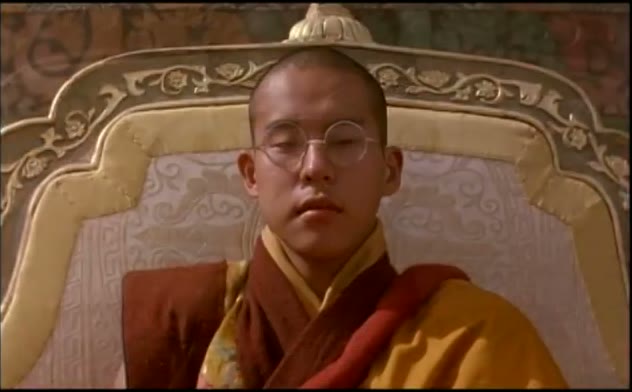Directed by:
Martin ScorseseScreenplay:
Melissa MathisonCinematography:
Roger DeakinsComposer:
Philip GlassCast:
Tenzin Thuthob Tsarong, Gyurme Tethong, Tulku Jamyang Kunga Tenzin, Tenzin Yeshi Paichang, Tencho Gyalpo, Tenzin Topjar, Tsewang Migyur Khangsar (more)Plots(1)
Barely able to walk, the young Tenzin Gyatso (played respectively by Tulku Jamyang Kung Tenzin, Gyurme Tethong, and Tenzin Thuthob Tsarong) is identified as the newly reincarnated form of His Holiness the Dalai Lama. Leaving his family behind in order to live in a monastery, he grows to manhood in spiritual isolation, sheltered from the influences of Western worldliness and the dangerous encroachment of the Chinese army, which invaded Tibet in 1950 and forced the Buddhist leaders into exile. Preaching peace and understanding among all people, the Dalai Lama eventually travels to China to meet Chairman Mao Tse Tung, to no avail. In a heartbreaking decision, the Dalai Lama must choose whether to remain in Tibet and fight for his people or flee his homeland and avert almost certain death. (official distributor synopsis)
(more)Reviews (3)
Beautifully and sensitively shot, much deeper in thought and information than Seven Years in Tibet, and with perfect cinematography. The Chinese government filed an official protest against it, and I don't think this film could have asked for a better accolade.
()
I don't like to link to someone else’s review, but Lima really nailed it this time. :-) Otherwise, as for my opinion, I can't but praise. Scorsese is a master filmmaker who could have sensitively and engagingly filmed perhaps Saddam Hussain's childhood, and the soundtrack by Philip Glass is simply phenomenal. And most importantly, the film is utterly engrossing, fully narrating a historical stage in the span of some twelve years without exceeding the two-hour runtime – call it what you will, but I call it art. 90%
()
Scorsese adapted the pace of the film to life in Tibet. The pace is incredibly slow, which can discourage many people. On the other hand, it is beneficial for conveying the message. Even when the Chinese army arrives, the pace does not change. It's as if Scorsese is trying his best to convey the Buddhist philosophy to the audience, which seems to be unaware of evil or accepting it without acting upon it. The film portrays the difference between how peaceful and gentle the world can be and how cruel and hostile it can become. The Dalai Lama is such an interesting character that even his childhood can keep the audience engaged in the film. Unfortunately, just like the slow pace, the overall tone of the film is also similar. It's as if nothing can be done, things will simply be as they are.
()

